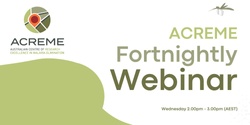ACREME Webinar: Evaluation of a pharmacokinetic-pharmacodynamic model for predicting parasitological outcomes in Phase 2 studies of new antimalarial drugs and The cost-effectiveness of tafenoquine following G6PD screening in Brazil: a transmission model analysis
Event description
Join the Australian Centre of Research Excellence in Malaria Elimination (ACREME) at the fortnightly webinars.
Evaluation of a pharmacokinetic-pharmacodynamic model for predicting parasitological outcomes in Phase 2 studies of new antimalarial drugs with Professor Julie Simpson
The unrelenting rise of multidrug resistant malaria demands the continuous development of novel antimalarial compounds from preclinical studies in human volunteers to Phase 3 clinical trials in patients.
This presentation will present a simulation study performed to assess the utility of a Bayesian hierarchical mechanistic pharmacokinetic-pharmacodynamic(PK-PD) model for predicting parasite-time profiles for a Phase 2 study of a new antimalarial drug, cipargamin.
The cost-effectiveness of tafenoquine following G6PD screening in Brazil: a transmission model analysis with Dr Angela Devine
While results from a Plasmodium vivax dynamic model have shown the potential impact of quantitative glucose-6-phosphate dehydrogenase (G6PD) test-and-treat strategies using tafenoquine for radical cure on cases averted, the cost-effectiveness has not been previous explored using a transmission model framework. Here, we explore the impact on the overall cost-effectiveness in Brazil under four scenarios. Our results provide strong evidence that tafenoquine prescribed after a quantitative G6PD test is highly likely to be cost-effective in Brazil.
Recordings will be available on the ACREME website.

